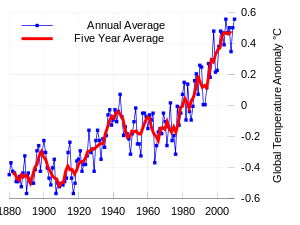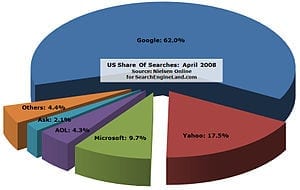
More than half of common plant species and a third of animals could see a serious decline in their habitat range.
A new study published in Nature Climate Change suggests that if nothing is done to curb climate change, the impact on animal and plant life could be catastrophic.
The study, which comprises of researchers from the U.K., Columbia and Australia, examined the impact of climate change (specifically rising temperature) on nearly 50, 000 different species.
The team carried out climate modeling and examined three main factors: climate sensitivity, ocean mixing and climate-carbon feedback that amplifies the temperature. By mapping the areas that would remain suitable for species habitation scientists were able to determine that there would be a great habitat loss unless mitigating factors emerge.
According to the report, global warming will destroy over half the habitat of plant life and a third of the habitat of animal life, a transition that may occur as a tipping point or over long periods. Temperatures are predicted to rise seven degrees Fahrenheit by 2100 due to global warming, according the Intergovernmental Panel on Climate Change (IPCC). The rise in temperature is largely due to burning fossil fuels, which retain heat and warm the atmosphere. Over the past century, global temperatures have risen about 1.4 degrees Fahrenheit, according data presented by the National Academy of Sciences. If this temperature rise happens at the rate predicated, large range contractions can be expected among common and widespread species.
The changes predicted by the model would likely lead to the extinction of some 34 percent of animal species and 57 percent of plant species, say scientists. The reason for the massive decline, according to the report, is largely due to the rapid change in temperature, which many species will struggle to adapt to over the course of just a few years.
“Our research predicts that climate change will greatly reduce the diversity of even very common species found in most parts of the world. This loss of global-scale biodiversity would significantly impoverish the biosphere and the ecosystem services it provides,” says Rachel Warren, of the University of East Anglia and a lead author of the study.
The team notes that the rapid change would have major ramifications for humans.
The Latest Bing News on:
Climate change
- Climate change must be real, based on how hard it is to hunt turkeys these days | Leggetton April 28, 2024 at 4:03 am
Everything's happening too early these days: early wildflowers and bluebonnets, early busy time to hunt spring turkeys. In the Hill Country, anyway.
- I’d much rather teenagers drink alcohol than protest climate changeon April 28, 2024 at 12:00 am
English children are the most likely in the world to have drunk alcohol, according to the World Health Organisation. The research resulted in criticism of middle class parents for serving wine at dinner.
The Latest Google Headlines on:
Climate change
[google_news title=”” keyword=”Climate change” num_posts=”10″ blurb_length=”0″ show_thumb=”left”]
The Latest Bing News on:
Loss of global-scale biodiversity
- Can granting ‘personhood’ to nature stem biodiversity loss?on April 28, 2024 at 4:59 am
In India, the Ganges and Yamuna rivers were granted living-person status, where injury to rivers was to be treated equally to injury to human beings. The decision was challenged on the grounds of ...
- Conservation is helping to halt biodiversity loss, new study revealson April 26, 2024 at 7:16 am
Nature conservation is not only having a positive impact, it could be transformational for halting and reversing biodiversity loss ...
- First-of-its-kind study shows conservation interventions are critical to halting and reversing biodiversity losson April 26, 2024 at 6:22 am
A new study in the scientific journal Science provides the strongest evidence to date that not only is environmental conservation successful, but that scaling conservation interventions up would be ...
- Conservation efforts are working to save species and protect biodiversity, study findson April 26, 2024 at 1:00 am
Conservation efforts are working to save species and protect biodiversity, study finds - International study finds conservation measures improve biodiversity or slow its loss in majority of cases ...
- Conservation slowing biodiversity loss, scientists sayon April 25, 2024 at 4:52 pm
Conservation actions are effective at reducing global biodiversity loss, according to a major study. International researchers spent 10 years looking at measures, from hatching Chinook salmon to ...
- Climate change could become the main driver of biodiversity decline by mid-centuryon April 25, 2024 at 2:39 pm
Global biodiversity has declined between 2% and 11% during the 20th century due to land-use change alone, according to a large multi-model study. Projections show climate change could become the main ...
- First-of-its-kind study definitively shows that conservation actions are effective at halting and reversing biodiversity losson April 25, 2024 at 11:32 am
A new study published online today, April 25, in the scientific journal Science provides the strongest evidence to date that not only is nature conservation successful, but that scaling conservation ...
- Global warming could become 'main driver of biodiversity loss'on April 25, 2024 at 11:00 am
Worldwide biodiversity declined between 2 per cent and 11 per cent during the 20th century due to changes in land use ...
- Getting to the other side of the biodiversity crisison April 15, 2024 at 3:08 am
Unless you’ve been hibernating, you know that planet Earth is in the midst of a full-blown, global-scale biodiversity crisis. Biodiversity refers to the total number of organisms across the planet ...
- Global Appetite for Meat Linked to Biodiversity Loss in Brazilon October 27, 2019 at 5:00 pm
"Our findings underline that local biodiversity loss is a global problem," said co-author Paz Durán of the Universidad Austral de Chile. "Although both companies and consumers are paying increasing ...
The Latest Google Headlines on:
Loss of global-scale biodiversity
[google_news title=”” keyword=”loss of global-scale biodiversity” num_posts=”10″ blurb_length=”0″ show_thumb=”left”]









